
Sea level projections from the 1990s were right.
www.sciencedaily.com/releases/202...
@marciszowna.bsky.social
Palaeoecologist & ecologist • 🩵 peatlands & testate amoebae • Professor at AMU Poznań PL

Sea level projections from the 1990s were right.
www.sciencedaily.com/releases/202...
Being on social media is fine but if it’s getting in the way of you doing deep reading and deep thinking, then your balance of how you spend your time is off
Lots of interesting threads here and none of them are a substitute for reading a good book or essay
Incredible serac fall from Hengsteren Glacier on Wetterhorn (3,690 m, Grindelwald) 🧊
37 degrees in the valley yesterday when this serac carve off 🥵
Meanwhile on the Monta Rosa the same day the temp at 3500m was between 6 and 13°C! 🔥
🎥 Kenton Cool
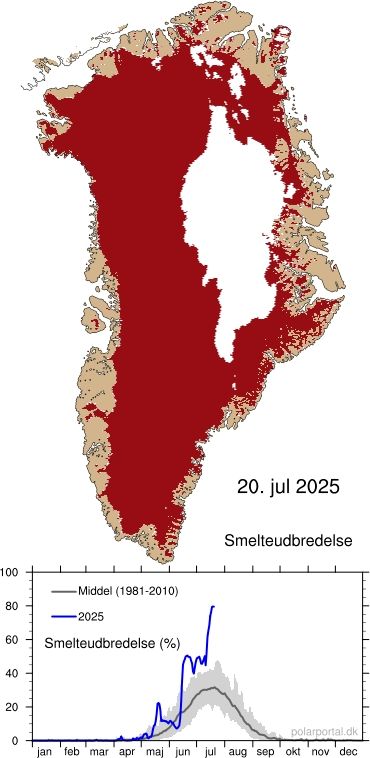
Screenshot from polarportal.dk, a website that makes research on the Arctic research conducted by Danish institutions available to the public and researchers. The image shows Greenland in tan and the Greenland Ice Sheet in red and white. The red part indicates melting and covers all except about 20% in the northeast, which is roughly the area higher than 2500 m above Se level. Below the map is a chart that compares 2025 melting to the 1981-2010 average. The average melting peaks in mid-July at about 35%. For the last few days, melting has occurred over roughly 80% of the area of Greenland, with a maximum melt area of 80.6% on 24 July 2025. This is the highest value in our dataset, which starts in 1981.
Melting over 80.6% of the area of the Greenland Ice Sheet. This is the highest value in our data set, which starts in 1981.
@polarportal.bsky.social
Writing is hard because the process of getting something onto the page helps us figure out what we think—about a topic, a problem or an idea. If we turn to AI to do the writing, we’re not going to be doing the thinking either. (Rosenzweig 2023)
05.06.2025 20:04 — 👍 9 🔁 2 💬 1 📌 0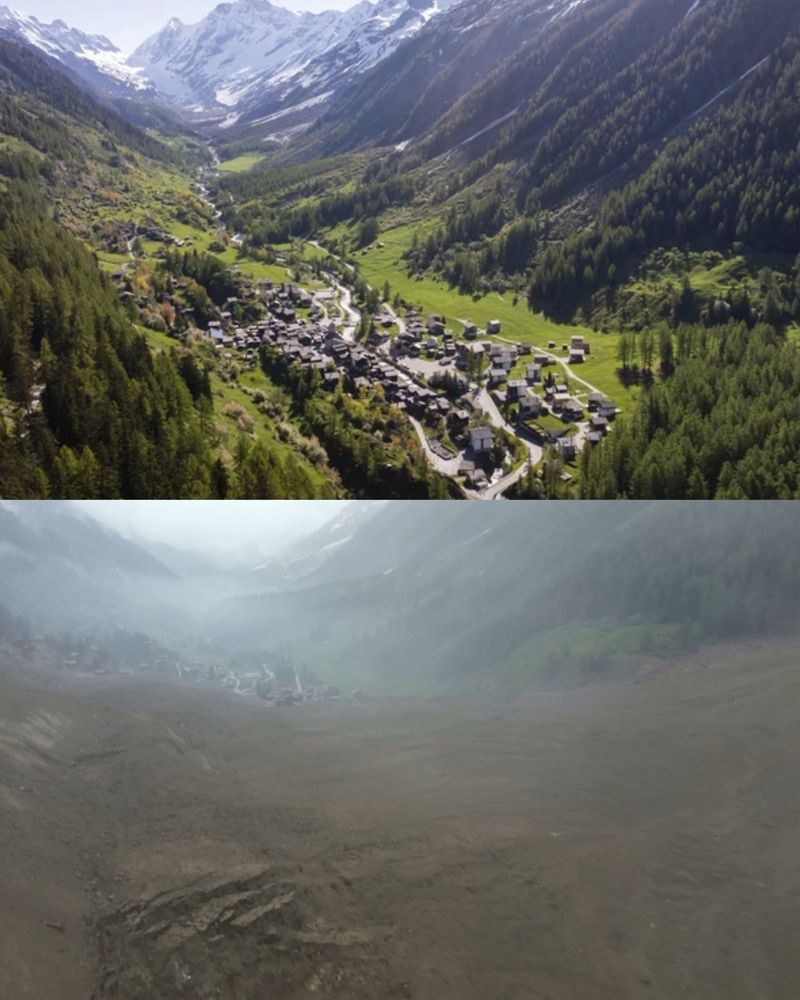
before and after today’s glacier collapse that buried 90% of blatten, switzerland
28.05.2025 22:01 — 👍 1371 🔁 622 💬 59 📌 148
Can we infer fire intensity from charcoal counts alone in #palaeoecology? Most possibly not! Using several charcoal-based methods & novel Raman spectroscopy we recommend using several #paleofire methods for more informative past fire reconstructions
@ncn.gov.pl #AMUPoznań @uniofaberdeen.bsky.social
I did the same and I'm very happy with my decision!
14.05.2025 18:57 — 👍 2 🔁 1 💬 0 📌 0
There was so much going on #peatland & #palaeoecology-wise at the #EGU25 this year! Lots of great talks, posters, discussions, gatherings... 😊 As I have almost 0 photos from the congress, here you go, a beautiful finding from a quick visit at @leopoldmuseum.bsky.social, a wetland by Carl Moll
04.05.2025 08:47 — 👍 10 🔁 0 💬 0 📌 0A great summary of our paper published this week in @pnas.org!
#palaeoecology #numismatics #history #archaeology

Our new paper in @pnas.org shows how the first Polish dynasty established a state and later, due to social and ecological imbalance, orchestrated its colapse.
We used #palaeoecology #archaeology #historical sources & #numismatics to show this complex process. www.pnas.org/doi/10.1073/...

How not to form a state: Research reveals how imbalanced social-ecological acceleration led to collapse in early medieval Europe | EurekAlert! www.eurekalert.org/news-release...
22.04.2025 10:32 — 👍 5 🔁 0 💬 0 📌 0
The new #EFFIS #Copernicus report is published. Wildfires burned around 148000 ha of protected areas in the EU in 2024, including areas that are part of Natura 2000, the network of protected areas covering Europe’s most valuable and threatened species and habitats.
op.europa.eu/en/publicati...
Torffrei gärtnern. Wichtig.
Aber nicht vergessen:
👉 die größte Menge Torf konsumieren wir durch den Verzehr von Gewächshaus-Gemüse.
Egal, ob aus Spanien, Deutschland oder Niederlande.
Fast alles 🥒🍅🍄🌶🍆🍓 auf Hochmoor-Torf gewachsen. 🤷♂️
/1/
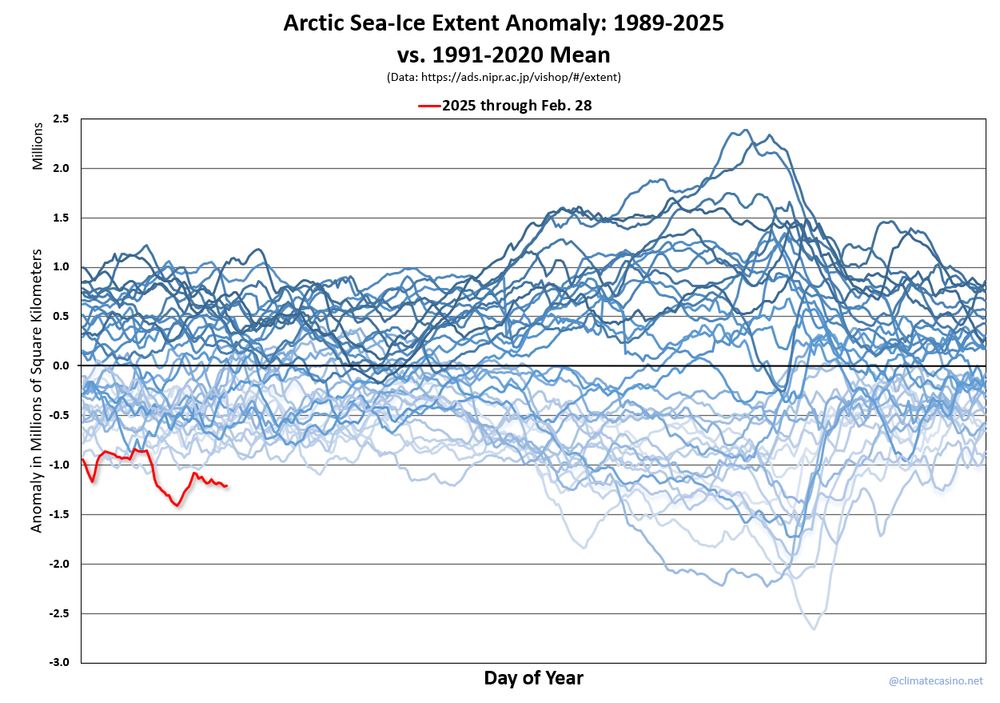
Arctic sea-ice extent anomaly graph for the years 1989-2025, showing that the current year is setting records for lowest sea-ice extent this time of year.
Arctic update for Mar. 1, 2025: Arctic sea-ice extent set a record daily low every day in February and is poised to set an all-time record low maximum this month.
01.03.2025 14:16 — 👍 409 🔁 145 💬 11 📌 17🌍 Global peatland drainage - 3 key facts🌱
1️⃣ Artificial drainage damages peatlands and their ecosystem services.
2️⃣ Drained peatlands are more susceptible to flooding and burning.
3️⃣ 85% of drained peatlands are located in Europe and Southeast Asia.
📚For more info check www.unep.org/resources/re...

Fantastic graphics by the Wildlife Conservation Society on where peatlands are globally, where they're protected, and extent of human pressures on these intensely carbon & biodiversity important ecosystems #peatlands #peatsky
storymaps.arcgis.com/stories/3265...
🌍 For World Wetlands Day we're launching 🚀 the most comprehensive European Wetland Map (EWM) 📅🗺️ yet! It shines a light on
• types of wetlands such as peatlands, floodplains and coastal peatlands
• their distribution
• areas in risk of flooding
Download here 👉 zenodo.org/records/1474...
On the one hand, I’m appreciating all the conversations about the turning point in social media, and that more people are quitting for more generative spaces like blogs and newsletters. On the other hand, that only works if you have an audience (often built on social media) to follow you there.
19.01.2025 14:04 — 👍 327 🔁 20 💬 16 📌 6Great idea! 🙃 You can add me to if it's not a problem.
13.01.2025 21:38 — 👍 2 🔁 0 💬 1 📌 1Hello, so, I'm an anthropologist who has studied wildfires for over a decade and, just recently, handed in a book manuscript for peer review on the pathologies of wildfire management in Australia and, to a lesser extent, Canada and the US. It's called "How to Control Fire" (TBC).
11.01.2025 03:39 — 👍 493 🔁 84 💬 24 📌 20
There's still a few days left to submit your abstract for the #EGU25. If you didn't decide yet on the suitable session for your #peatland #palaeoecology contribution consider our session on long-term peatland records!
Cc. @utriculator.bsky.social @eurogeosciences.bsky.social
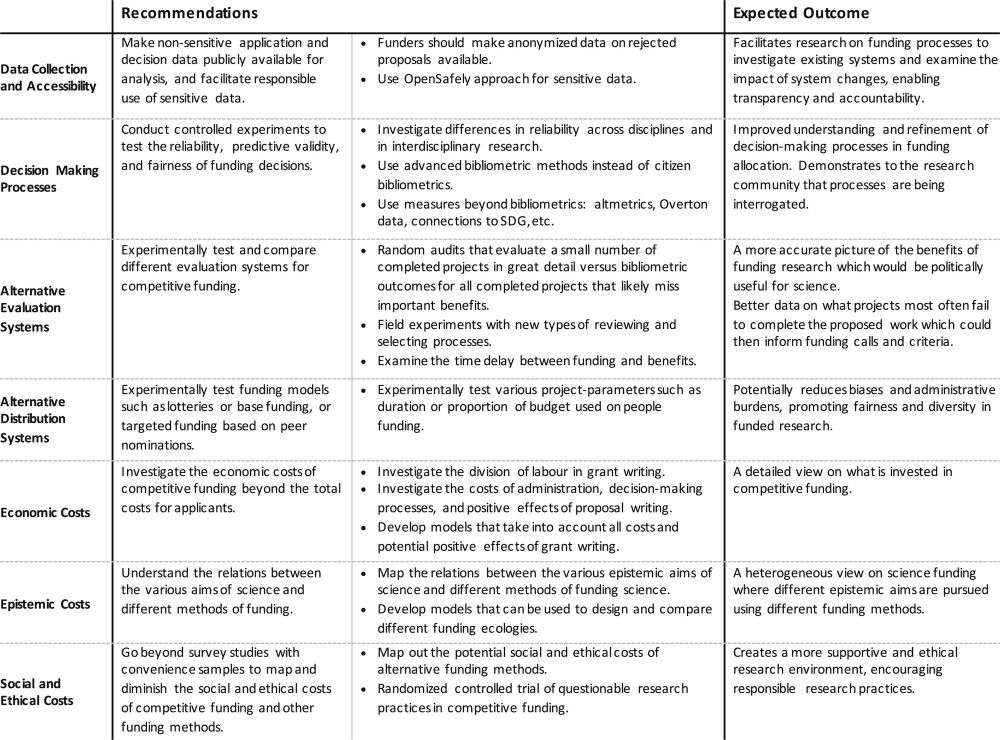
Researchers spend approximately 45% of their time on administrative activities related to #grants rather than actual #research. The current #competition in research #funding has significant drawbacks; evidence-based improvements of the funding system are required: www.pnas.org/doi/10.1073/...
22.12.2024 19:05 — 👍 516 🔁 236 💬 18 📌 39
“Women are asked more questions during a seminar and the questions asked of women presenters are more likely to be patronizing or hostile. These effects are not due to women presenting in different fields, different seminar series, or different topics…”
www.nber.org/papers/w28494
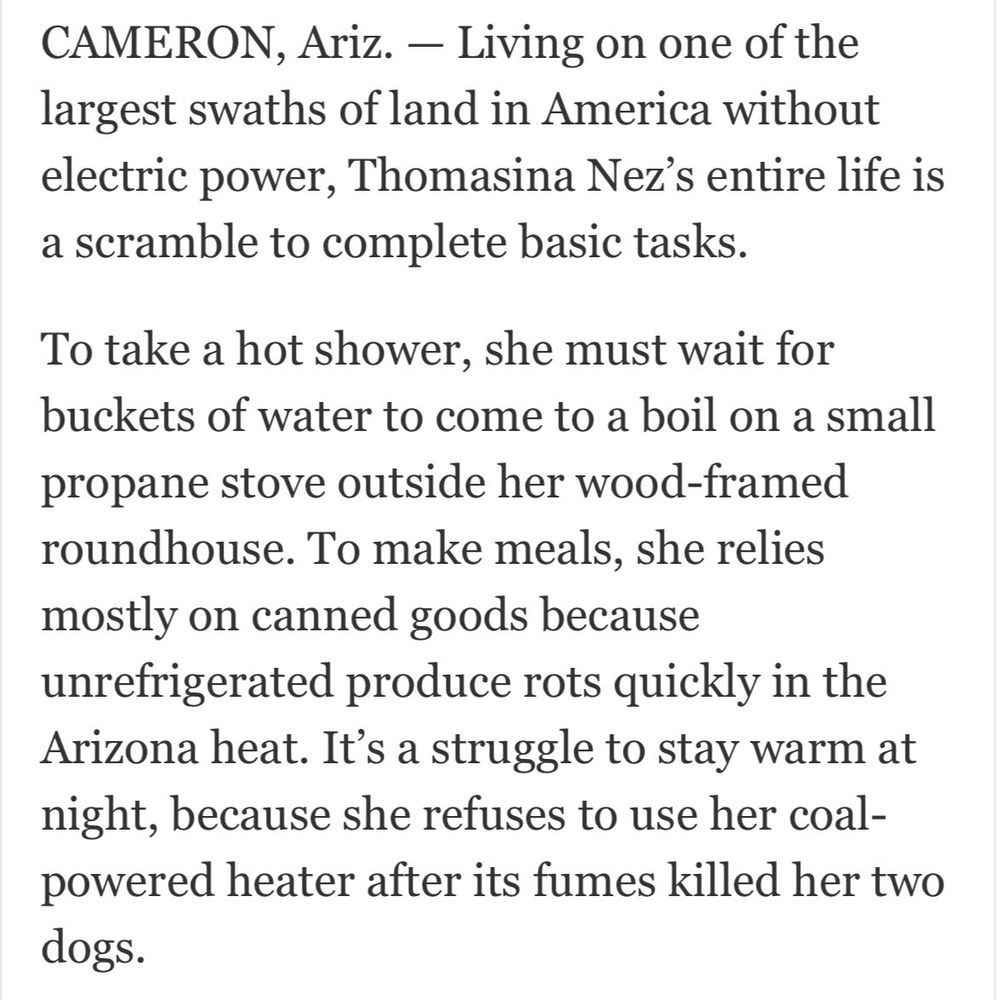
Cameron, Ariz. Living on one of the largest swaths of land in America without electrical power, Thomasina Nez's entire life is a scramble to complete basic tasks. To take a hot shower, she must wait for buckts of water to come to a boil on a small propane stove outside her wood framed roundhouse. To make meals, she relies mostly on canned goods because unfridgerated produce rots qucikly in the Arizona heat. Its a struggle to stay warm at night, because she refuses to use her coal-powered heate after its fumes killed her two dogs.
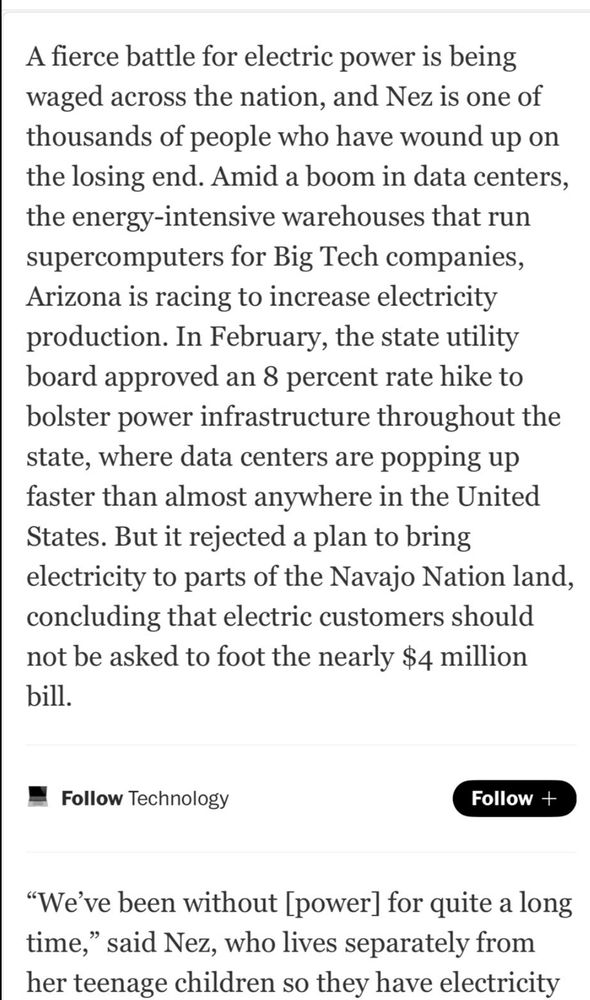
A fierce battle for electric power is being waged across the nation, and Nez is one of thousands of people who have wound up on the losing end. Amid a boom in data acenters, the energy intensive warehouses that run supercomputers for Big Tech companies, Arizona is racing to increase electricity production. In February, the state utility board approved an 8 percent rate hike to bolster power infrastructure throughout the state, where data centers are popping up faster than almost anywhere in the US But it rejected a plan to bring electricity to parts of the Navajo Nation land, concluding that electric consumers should not be asked to foot the nearly $4 million bill.
I know academics who use AI regularly, for work and play, and I'd really like them, and universities, to tell me how they contend with AI's bottomless appetites for power and water.
Is asking ChatGPT to interpret a Xmas song or making it write your syllabus worth this to you?

Boardwalk through a Sphagnum-farming field in the Ahlenmoor, Germany (Photo: Meike Lemmer)
🕯️🕯️🕯️🕯️⭐️ Merry 4th Advent-week, cherished #peatland people!
“Alas! How dreary would be the world if there was no #PeatECR! There would be no #PeatNeeds then, no #PeatWrites, no #PeatCalendar to make tolerable this existence.”
Join the team and keep the support active! ☃️
📷: @meikelemmer.bsky.social

Eddy-covariance tower in a vast peatland. Photo: Andreas Heinemeyer
🕯️🕯️🎄Happy second Advent-week to all #PeatECR and #peatland folks!
We’re looking for dynamic, motivated new members to continue our mission to support PeatECR all over the world 🤝🌎
Contact us via 🌐www.peatecr.com or via 📧 peatecr@gmail.com for more information.
📸: @andreasheinem.bsky.social

#AGU24 @agu.org here we come! 😊 w/ @utriculator.bsky.social
07.12.2024 10:39 — 👍 7 🔁 0 💬 2 📌 0
Rada Narodowego Centrum Nauki za rezygnacją z Planu S‼️
Rada opowiedziała się „przeciw nakładaniu na grantobiorców ograniczeń rozliczenia projektu poprzez konieczność udostępniania w otwartym dostępie publikacji powstałych w czasie jego realizacji”.
Ostateczną decyzję podejmie dyrektor #NCN.

Female Foundations: The Lives and Legacies of Women in Earth Sciences CALL FOR PAPERS *EXTENDED DEADLINE* We are hosting a day school to coincide with International Women’s Day 2025 on 8 th March 2025 in Dorchester, Dorset, UK. We welcome proposals for papers that celebrate individual or collective women’s contributions to science (broadly defined), with a focus on how their work, research or scientific endeavour enabled a progression of ideas or shift in practice within their field. We are therefore not inviting purely historical accounts, but how a past or current woman’s work has been influential and why we should celebrate them. We are delighted that the award-winning author Tracy Chevalier, will be joining us to talk about her work on Mary Anning. We invite abstracts (c. 150-250 words) for oral papers of a 20 minute duration, by 30/12/24 to anne@pastparticipate.co.uk
Exciting upcoming conference - Female Foundations: The Lives and Legacies of Women in Earth Sciences
Proposals for papers that celebrate individual or collective women’s contributions to science. Abstracts to anne@pastparticipate.co.uk #science #archaeology #geology #EarthSciences #palaeontology